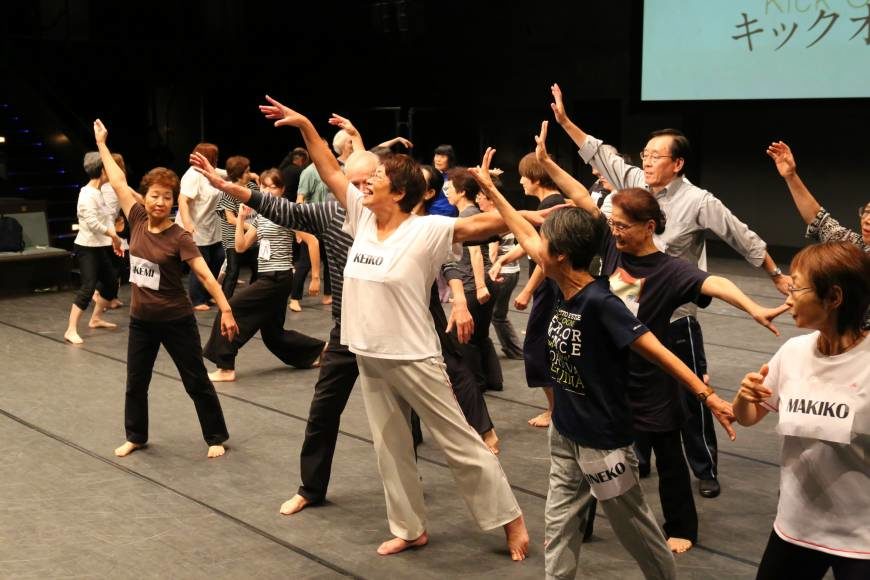Renowned theater director Yukio Ninagawa broke new ground when he launched Saitama Gold Theater in 2006. Instead of seasoned actors, he filled his troupe with amateurs who were all older than 55.
Now, nearly 100 groups of senior-citizen actors can be seen across the country, while countless thousands are taking to stages around the world. What once may have seemed like a novel idea, is shaping up to be something of a legacy for Ninagawa, who passed away in 2016.
Hiroshi Watanabe, the executive producer overseeing Saitama Arts Theater, where Ninagawa was artistic director, recalls how they were inundated with applicants to attend the open auditions for Gold Theater’s initial lineup.
“Most of them had no experience,” he says with a laugh. “That didn’t matter, though, because he was driven by pure artistic curiosity to make theater that way.”
Recognizing a growing trend, the upcoming launch of Saitama Arts Theater’s new annual World Gold Theater festival features two elderly dance programs from England and Australia, and a seniors’ theater from Singapore in the event running from September 22 to October 8. Also on the bill will be two outdoor performances by Saitama Gold Theater, while more than 700 members of the Saitama theater’s recreational Gold Arts Club will sing and dance in French playwright Moliere’s 1673 satire on doctors titled The Imaginary Invalid. There will also be symposiums and workshops on related themes and topics.
The idea of seniors’ theater in Japan and overseas was given a large push when Saitama Gold Theater made its international debut in Paris in 2013, following it up with a Ninagawa-directed performance of Richard II in Japan in 2015. That production drew the interest of theater fans from as far afield as Britain who wanted to see what was happening here.
“Britain is quite advanced in art activities for the elderly, but they were amazed by the quality of Richard II,” says Sachiko Ukegawa, World Gold Theater’s program director.
In the years that followed, Ukegawa and Watanabe went to the U.K. to check out several different elderly-related projects.
“We found there were so many approaches being taken to get old people into theaters, from holding tea parties to dance circles, pottery groups and so on,” Watanabe says.
David Slater is the artistic director for the elderly-focused London-based Entelechy Arts Company. He met both Watanabe and Ukegawa on one of their trips to Britain, and is now in Saitama working with six Gold Theater actors on a piece by his own company titled Bed, which will feature at the upcoming World Gold Theater festival.
In Bed, actors adopt a persona and lie alone in a bed in an outdoor space, interacting with the public. So, on Sept. 29 and 30 outside Yonohonmachi Station and in a shopping mall next to Omiya Station, the six Gold Theater actors will take part in a Japanese version of this street-theater performance. No one has any idea what will happen if and when curiosity gets the better of passersby and officials.
One of those actors, Mitsuyo Obuchi, says she is enjoying working with Slater.
“He has created a really detailed character for me and the process has been very interesting,” the 72-year-old says. “Yet I’m still a bit scared to be in a bed alone in the street.”
So why is she doing it?
“Well, when I was working with Ninagawa he always taught us to cast off our old skin and start again from scratch with an open mind,” she says. “I didn’t want to make a fool of myself, but he said nothing of value would come from staying in our own small shells.”
Another Bed actor, Masatake Takei, says his rehearsals with Slater have involved the creation of a lonely character.
“I’m sure many people feel that way every day, but I’ve never done so and acting is also such a source of energy,” the 75-year-old says.
“Isolation is a huge issue in Britain and a key question isn’t how to just support people to stay alive in later life, but how to help them flourish,” says Slater, adding that on one occasion a woman of 92 died while chatting with friends after they’d all finished a performance. “So right till the end, she’d been doing something with meaning and value and purpose. I think that’s one of the many things the arts can offer.”
Noting the financial strains caused by a population that is living longer, Slater says the authorities in Britain will often turn to artists for solutions to help out.
“If you give people support and a space, they are very powerful performers, storytellers, and communicators,” he says.
The benefits work both ways. Medical experts have cited taking part in the theater as being good for older people as the balance, mobility and strength involved in performing has a positive effect on health in general. There are also a lot of psychological benefits to be had from the social engagement that comes with it.
“In England, the physical benefit of dance for elderly people is widely accepted,” Ukagawa says. “There is also an emotional benefit in being presented with meaning later on in your life.”
Watanabe expands further: “The whole area around the Saitama Arts Theater is crowded from early morning as elderly performers gather to meet, and that makes local businesses happy. Also, because they’re getting out more, those people are healthier and that puts less strain on hospitals.”
“However, they still need help from others, and that’s why Ninagawa followed Saitama Gold Theater with Saitama Next Theater, which focused on young people. Then he had them both help each other; they even shared the stage in his Richard II.”
Watanabe says both troupes working together help create the impression of a “big family” and says he would encourage public theaters around Japan to try out such programs themselves.
Ninagawa once said that “Saitama Gold Theater was born out of a search for new forms of theater based on the personal histories of people of age.” It seems his efforts may have established a theater for the ages as well.
This article originally appeared in The Japan Times on September 20, 2018, and has been reposted with permission.
This post was written by the author in their personal capacity.The opinions expressed in this article are the author’s own and do not reflect the view of The Theatre Times, their staff or collaborators.
This post was written by Nobuko Tanaka.
The views expressed here belong to the author and do not necessarily reflect our views and opinions.


















